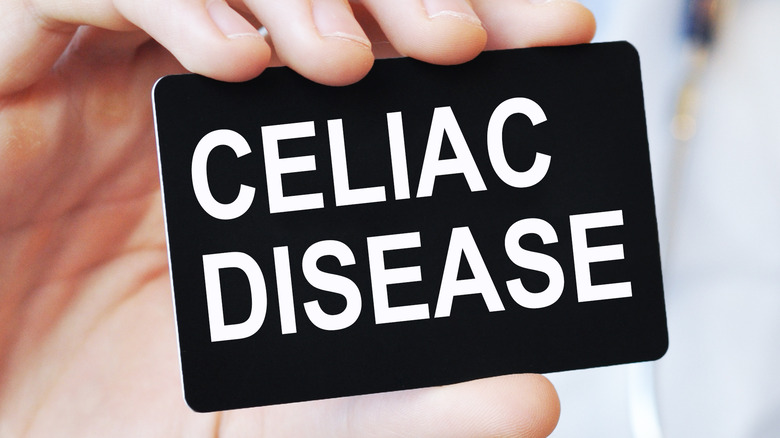What Happens If Celiac Disease Goes Untreated?
Those who experience gluten intolerance know how challenging it can be to avoid certain foods and live with the potential digestive symptoms that can come from consuming gluten. For those with celiac disease, these challenges can be even more severe. Early diagnosis and treatment of celiac disease are critical, and when left untreated, serious complications can follow.
When you have celiac disease, the body mounts an immune system reaction to gluten, according to MedicalNewsToday. Gluten is a type of protein that's generally found in wheat, barley, and rye, which makes it difficult to avoid. This autoimmune condition causes inflammation in the gut, which eventually leads to damage to the small intestine. This can cause issues with the absorption of necessary nutrients and minerals.
Celiac disease is fairly common, affecting at least one in 100 people worldwide. However, many people go undiagnosed, and it's thought that at least 2.5 million people in the U.S. have undiagnosed celiac disease. The condition runs in families, so if you have a family member with celiac disease, you have a one in 10 chance of developing it as well.
The complications of untreated celiac disease
The only treatment for celiac disease is to maintain a strict gluten-free diet, according to MedicalNewsToday. This can allow the intestines to heal from chronic inflammation, though there's currently no cure for the condition. Even consuming minuscule amounts of gluten, like crumbs on a cutting board, can trigger an immune response, according to the Celiac Disease Foundation.
If left untreated, complications can be severe (via Celiac Disease Foundation). Untreated celiac disease can lead to other medical conditions, like early-onset osteoporosis, gallbladder malfunction, heart disease, infertility and miscarriage, anemia, lactose intolerance, liver failure, and small intestine cancer. Neurological symptoms, including attention-deficit/hyperactivity disorder (ADHD) and seizures, can also occur, along with dementia. It's also linked to other autoimmune disorders like type 1 diabetes and multiple sclerosis. Those with celiac disease have twice the risk of developing coronary artery disease and four times the risk of developing small bowel cancers.
It's important for those with celiac disease to read labels carefully, as gluten may be an ingredient in products you wouldn't expect, like candies, salad dressings, and seasoned snack foods (via Mayo Clinic). While a celiac disease diagnosis may feel stressful and difficult, having a supportive network and trained medical providers can help you manage symptoms.


